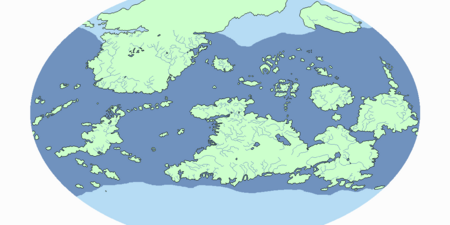Amanir
 Continents of Amanir | |
| Orbital characteristics | |
|---|---|
| 149598023 km[1] | |
| Eccentricity | 0.0167086 |
| ~365.3 days | |
| Physical characteristics | |
Mean radius | 6371.0 km[2] |
| 510072000 km2[3] | |
| Mass | 5.972 × 10^24 kg |
| 9.81 m/s2 | |
| 40270 km/h[4] | |
| Albedo | 0.367 geometric |
| Atmosphere | |
Surface pressure | 101.325 kPa |
Amanir, sometimes reffered to as simply the world — conworld[5] of the members of the Federation of Allies, a NationStates region. Lorewise, Amanir is a planet located in an unspecified star system and galaxy, possessing extrimely Earth-like qualities, including mass, gravity, size and atmosphere nearly identical to that of Earth, as well as one major moon. Amanir has wide oceans and numerous archipelagos, as well as several major continents. In contrast to Earth however, most of Amanir's landmasses are located on the southern hemisphere.
Amanir as a project combines both a priori and a posteriori elements, meaning that it is a site of both real-life languages or scripts on one side and conlangs[6], as well as constructed religions and scripts, on the other. There is no fantasy races like elves or dwarves however, unless they are purely mythological and appear in beliefs of human nations. Status of magic is as of yet unclear, with some within the region proposing a limited existence of magic and others opposing it all togather.
One of the characteristical features of Amanir is the existence of megafauna and many other relatively recently extinct species.
Name
Etymology
The name Amanir comes from Aydinirian word Amanir [ama'ɲir] and ultimately from Old Aydinirian Amanıer [ama'nʲɛr], meaning "beautiful land". It has deep connections with Jarist cosmogony, as it was supposed to be a descriptive name given by the First Cause to the world upon its creation. In Modern Aydinirian amanir as "world" is often used in poetry.
The planet has also many other names in different languages spoken at its surface.
Names in other languages
| Language | Name |
|---|---|
| Old Aydinirian | Māsālir, Ćashtanir[7] /ma:sa:'liɾ/, /ɕaʂta'ɲiɾ/ |
| Aydinirian | Amanir, Awestar, Firyaxar[8] /ama'ɲir/, /awɛs'tar/, /firja'ksar/ |
| Saruzh | |
| Üxa | |